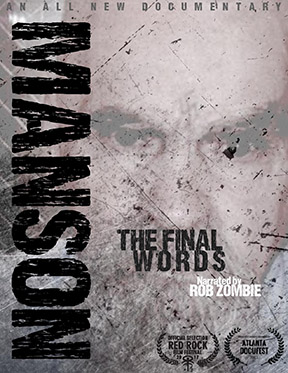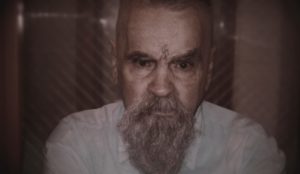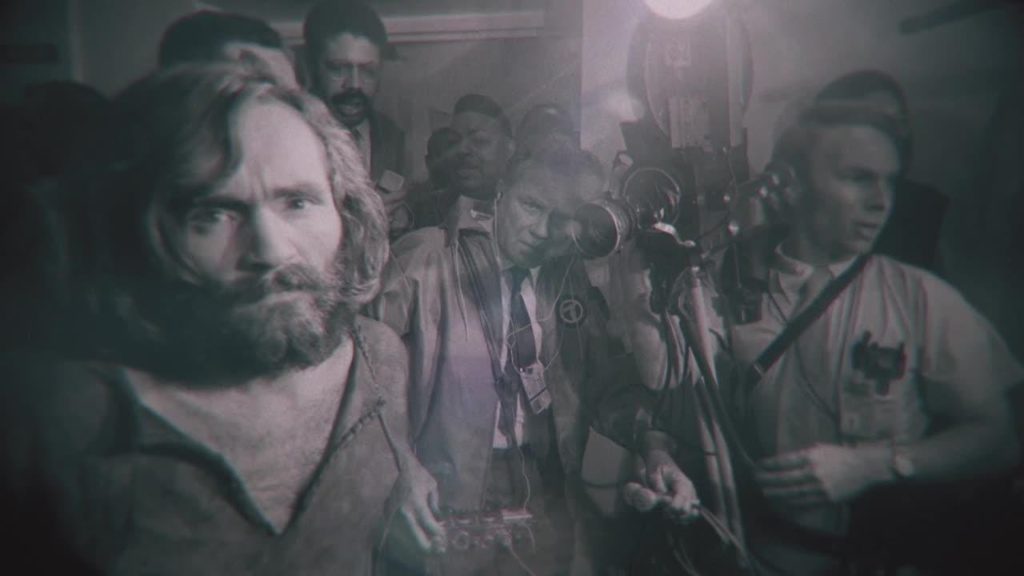It’s important to see all the sides to any given story…
Narrated by Rob Zombie himself, Charles Manson: The Final Words focuses on the Manson Family Murders from his own perspective using never before seen cases files, pictures and interviews including with Manson himself from behind bars inside California State Prison. Hearing his voice wax philosophical about his time behind bars, modern society while reconstructing the events that lead to brutal Sharon Tate slayings along with new interviews from former members of the Manson family themselves along with investigators and prosecutors really paint a narrative about the Manson family myth and ethos that you’d never expect!
Now available on iTunes for mass consumption, I got the unique pleasure to sit down with director Buddy Day about the making of the film, his motivations for telling this side of the story, his experiences actually talking to Charles Manson, making sure the horrific elements of it all were never lost on the audience and so much more.
Dave Voigt: I thoroughly enjoyed the film because I really didn’t expect the angle that you took with it all. What ultimately inspired you to not only make a film about Charles Manson, but to go to this part of his story with your film?
Buddy Day: That angle is really what interested us in the first place, we were filming another series that we do for Reelz called The Shocking Truth and in the course of all that I had met some authors who were working on a manuscript and had been talking to Charles Manson about the idea that there was this ‘other’ narrative in his story that had been unexplored. That initially planted the seed for the narrative but we had always set out with the mindset to do a documentary that was looking at the other side of the story.
At the beginning of the process we weren’t exactly sure what the story was going to be but from the get go it was always our intent to explore if there was another narrative surrounding him there at the time of the trials, something separate from the ‘Helter Skelter’ framing of events.
DV: Was there any kind of push back on a thing like this while you were making because I can imagine there may have been some people who really didn’t want to steer away from the ‘Helter Skelter’ narrative like you do.
BD: Not really and surprisingly, taking that angle really worked as an asset in our favor. I mean I did initially have those thoughts and we worked so closely with Reelz who were quite open to the idea and we were quite honest with them from the get go that this was going to be a different take on it all and even maybe explore some ideas that maybe he was or is ultimately innocent of the murders. It helped that we were looking to see if there was a ‘truer’ version of events that happened with the Sharon Tate murders and working directly with Charles Manson did open up quite a few doors in that respect. We kept hearing over and over as we were doing all the interviews and compiling all the information that we could that they loved that we were doing it and that no one had ever really had the guts to go down this road like we were and then after it aired so many of our subjects reached out to us and were so pleased at how it all came across and that someone had finally taken it on. On every level the push back was so minimal it was actually pretty surprising.
DV: As a documentarian it’s always important for you to maintain a certain degree of separation from your subject…but when it’s Charles Manson I can imagine things playing out a little differently. How did you manage find that boundary while making the film?
BD: Yeah, I kind of did get to know him as much as you can while making the film but ultimately I really just approached him as a human being and actively tried to block out everything that I thought I knew about the man. I had to challenge him at times but just in the course of being honest and human with him and sometimes he’d get really angry at me, and threaten me and then hang up…and I’d go “I guess that’s the last time I’m talking to him” and then he’d call back later. I really think that he appreciated the idea that I was just approaching him as directly as I possibly could. I never came in with any kind of agenda other than just to talk to him.
DV: Did it help because while you’re asking him to open up, you have to open up a little about yourself as well which I can imagine is a pretty scary thing.
BD: I think that what people really misunderstand about Charles Manson is that he is this ‘master manipulator’ which he was often characterized as but I don’t really feel like that is accurate. I think what he was really good at is that he could read people and then spit what they were bringing back at them. If you went into him looking for some kind of spiritual leader, then that’s what he’d be. If you went looking to him for a madman/serial killer then that’s exactly what you’d see, that’s what he was really good at doing. When I spoke to him, I didn’t give him anything and ultimately I think that’s what he found fascinating and I think that’s why he opened up a bit because I never gave anything back to him.
DV: How long did it really take for the entire film to come together because after watching it I can really feel like this is the kind of movie that came together in post-production not necessarily while you were making it.
BD: It was a little of both, because while we did find out quite a bit while we were making everything because we were doing all of these interviews and the second we learned something that would change the course of the narrative. We always had an idea of the story we wanted to tell from the outset but it did change a lot along the way and we were ready for that. Then when Manson died the narrative got changed even more as we ended up really documenting the last year of his life which is something that we really never intended on doing but that’s what it turned out to be. From beginning to end the entire film really only took about a year to put together, which is admittedly a little quicker than usual but it all basically started when we started calling him and when he died that’s when we finished it really…(Laughs)
DV: Like most documentary films there are moments in the film where you stage some recreations (specifically the murder scenes) and those scenes definitely felt a little more visceral and brutal then I was expecting. Was that something by design on your part to make us a little more on edge while unfolding the story?
BD: Oh yeah it was. We had kind of settled on a style and we wanted those moments to certain come across as ‘horror movie-esque’ and we shot it that way on purpose. We didn’t want to hold back on the violence in any way. I think that there’s a certain expectation that when you watch anything about Charles Manson that it’s going to be brutal and this certainly was a string of grisly murders where people were stabbed to death and it was important to us to not shy away from that. I think that when you’re watching True Crime; be it TV or a documentary that you really do want the gravity of the violence of the moment to really bring it home for the viewer because it helps you remember that these are actual people as well.
 DV: Plus hearing Rob Zombie’s voice narrate the whole thing actually made me focus that much more throughout the whole thing! (Laughs)
DV: Plus hearing Rob Zombie’s voice narrate the whole thing actually made me focus that much more throughout the whole thing! (Laughs)
BD: Yeah he was really great and amazing to work with from day one.
DV: At the end of the day there have been films and stories about Charles Manson before and there are a certain amount of preconceived notions about him and the story behind the murders what is your ultimate hope for the movie now that it is out there a little more and available on iTunes and similar platforms. What do you feel like the end mission of the film will be?
BD: I really hope that it changes the conversation about Charles Manson because there really is so much myth out there about the man himself and in many ways he became more myth then reality at some point. Even when you watch these big scale documentary series, features and specials about Charles Manson, they’ll mention Sharon Tate, but never mention Bobby Beausoleil. It amazes me that they’re telling the stories of these crimes they are so ill informed as to the context of them. The one thing that I was really amazed by is that every article I’ve read, almost without fail in some major news publications that I can pick out so many factual inaccuracies and things that were misconstrued or misreported and I hope that the film can change people’s perceptions on what actually happened and what they think they know about Charles Manson
DV: And that’s the real hook right, because no one is doubting that Charles Manson is a ‘bad’ person and the film never once makes a case otherwise, but when you see all of these sort of head scratcher moments that go down it gets you from a pure entertainment standpoint because as a viewer you want to see where they go.
BD: Oh yeah, and I mean Charles Manson would be the first to admit that he was not a ‘good’ guy (laughs). We would talk about that often and he was quite proud that he lived a life in the criminal underworld and that he was this survivor who had done some pretty scary things, and he was proud that people were scared of him. I remember him telling me once something to that effect and I asked him “Do you find that people are generally afraid of you?” and it took him a back and with a pretty sarcastic tone to his voice he said “I would imagine so!” (Laughs). Granted in prison you need people to be afraid of you so that they don’t kill you, but also it was something that he was actually pretty proud of. I totally agree that he did some VERY bad things and he’d be the first person to admit to that, but the really interesting question here is that regardless of who he is, what he has done and what he may do, at the time; did he get a fair shake in the justice system? That was the point that we really wanted to hammer home that everyone deserves a fair trial…even if you are Charles Manson. If the prosecution did create this spectacular and sensational conspiracy narrative in order to convict him then what does that mean? Because that just raises a whole host of questions.
Charles Manson: The Final Words is available on iTunes now.


